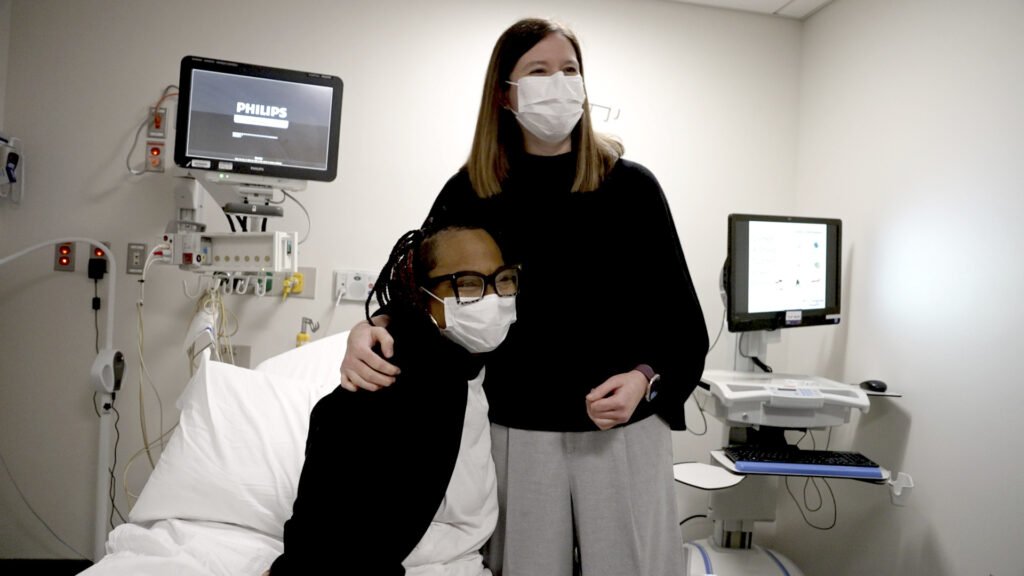An Alabama woman who made medical history by living with a pig kidney for a record 130 days had the organ removed after her body began rejecting it. Towana Looney, from Gadsden, Alabama, is now back on dialysis following the disappointing outcome of the xenotransplant procedure.
Looney underwent the experimental pig kidney transplant at NYU Langone Health on November 25. Despite the setback, she expressed gratitude for being part of the groundbreaking research. She emphasized the importance of the experience in advancing the understanding of xenotransplantation and its potential to help others with kidney disease.
The use of pig organs in transplants is being explored as a solution to the shortage of human organs available for transplant. With over 100,000 people on the U.S. transplant waiting list, the need for alternative options is urgent. Previous attempts at xenotransplantation in severely ill patients resulted in limited success, with recipients surviving no longer than two months.
Researchers are now focusing on slightly less sick patients, like Looney, in an effort to improve the outcomes of pig organ transplants. A New Hampshire man who received a pig kidney in January is reportedly doing well, and a comprehensive study on pig kidney transplants is scheduled to start later this year. Additionally, Chinese researchers have reported a successful kidney xenotransplant, showing promising advancements in the field.
Looney, who had been on dialysis since 2016 and was not eligible for a traditional human kidney transplant due to rejection issues, opted for the experimental pig kidney. While the pig organ initially functioned well, her body eventually began rejecting it in early April. Dr. Robert Montgomery, Looney’s surgeon, explained that the decision to remove the kidney was made to avoid further risks associated with trying to save it with higher doses of anti-rejection drugs.
Rejection is a common challenge in all types of organ transplants, including xenotransplantation. Balancing the suppression of the immune system to prevent rejection while allowing the body to fight infections is crucial. The use of immune-suppressing drugs in xenotransplantation adds another layer of complexity, with the optimal drug combinations still being studied.
Despite the setback, Looney’s experience provides valuable insights for future xenotransplant procedures. Dr. Montgomery emphasized the importance of incremental progress in making xenotransplantation a viable option for patients in need of organ transplants. The ongoing research and clinical trials in the field hold promise for improving the success rates of pig organ transplants and addressing the critical shortage of transplantable organs. In today’s fast-paced world, it can be easy to overlook the importance of self-care. With so many responsibilities and obligations pulling us in different directions, taking time for ourselves often falls to the wayside. However, self-care is crucial for maintaining our overall well-being and mental health.
Self-care is defined as any activity that we do deliberately to take care of our mental, emotional, and physical health. It is a way to recharge our batteries, clear our minds, and refocus on what truly matters. Self-care looks different for everyone, as it is a highly individualized practice. For some, self-care may involve taking a long bath, reading a book, or going for a walk in nature. For others, it may mean spending time with loved ones, meditating, or practicing yoga.
Regardless of how we choose to practice self-care, the important thing is that we make it a priority in our lives. When we neglect our own needs, we run the risk of burnout, increased stress, and a decline in our overall health. By taking the time to care for ourselves, we can better handle life’s challenges and be more present in our relationships and daily activities.
One of the key benefits of self-care is its ability to help us manage stress. Stress is a natural part of life, but when left unchecked, it can have detrimental effects on our mental and physical health. By incorporating self-care practices into our daily routines, we can reduce our stress levels and increase our resilience to life’s ups and downs.
Self-care also plays a crucial role in maintaining our mental health. In a world that is constantly bombarding us with information and stimuli, it is important to take a step back and give our minds a break. Whether it’s through mindfulness meditation, journaling, or simply taking a few deep breaths, self-care can help us clear our minds and focus on the present moment.
Additionally, self-care can improve our overall sense of well-being and happiness. When we take the time to do things that bring us joy and fulfillment, we are more likely to feel content and satisfied with our lives. By prioritizing self-care, we can cultivate a greater sense of self-awareness and self-compassion, leading to a more positive outlook on life.
In conclusion, self-care is an essential component of maintaining our overall well-being and mental health. By making self-care a priority in our lives, we can better manage stress, maintain our mental health, and improve our overall sense of well-being. So, take some time for yourself today and practice self-care in a way that feels meaningful and fulfilling to you. Your mind, body, and spirit will thank you for it.


